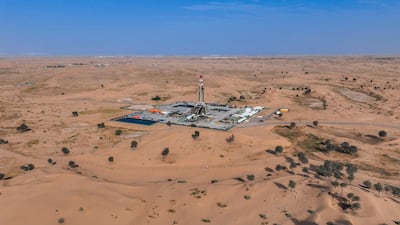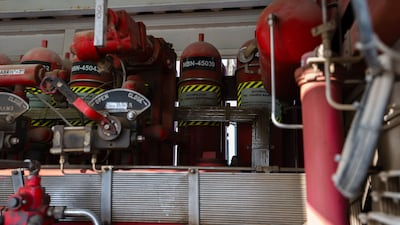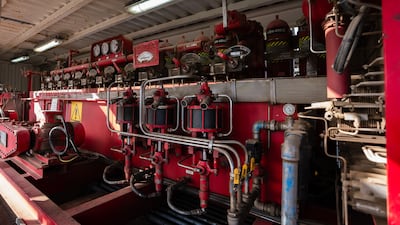Sharjah has discovered new gas reserves in the onshore Al Hadiba field.
The emirate, however, did not reveal the volumes of gas discovered as it has yet to test the field located north of the Al Sajaa Industrial Area in Sharjah, which has “promising quantities” of gas reserves, according to the Sharjah Government Media Bureau.
“The new field was discovered after the Sharjah National Oil Corporation (SNOC) drilled a well over the past few months, and the well will be tested in the days ahead to confirm the quantities and potential gas reserves of the field for development,” a statement released on Saturday said.
The Al Hadiba field is the fifth onshore field in Sharjah, in addition to Al-Saja’a, Kahif, Mahani and Muayed fields.
The announcement comes after Sharjah, in 2020, discovered a new onshore well of natural gas and condensate in the emirate, its first in more than three decades.
State-owned SNOC and Italian oil company Eni discovered the “Mahani” exploration well within the first year of their partnership, SNOC said at the time.
The SNOC, established in 2010, is tasked with the exploration, production, engineering, construction, operation and maintenance of Sharjah's energy assets.
In addition to the Mahani gasfield, it owns and operates three onshore fields, a gas processing complex, two hydrocarbon liquid storage and export terminals and a network of flow lines and production pipelines.
The emirate’s sole gas supplier is also exploring green hydrogen and carbon capture projects amid efforts to reach net-zero emissions by 2032, its chief executive Hatem Al Mosa, told The National last year.
In July, the company signed an initial agreement with Japan’s Sumitomo Corporation to explore a carbon capture project in the emirate.
The demand for natural gas in the coming decades is expected to rise globally amid decarbonisation efforts, according to the Gas Exporting Countries Forum.
The global demand for natural gas will rise to 5.36 trillion cubic metres in 2050 from 4.02 trillion cm in 2022, the organisation said in its global gas outlook report in March.
“The increase in population and economic output, and policies aimed at air quality enhancement, greenhouse gas emission reduction, stability of renewable power systems, universal access to clean cooking, and the switch from coal and oil to gas are pivotal factors influencing the forecast,” the report said.
“Natural gas, coupled with CCUS [carbon capture utilisation and storage], is poised to underpin long-term demand, while the utilisation of blue hydrogen [produced from natural gas] offers an additional pathway for decarbonising hard-to-abate sectors.”
In the Middle East, natural gas, which contributed 53 per cent to the regional energy mix in 2022, is forecast to persist as the most utilised energy source, the report added.
Demand is expected to rise by 1.5 per cent per annum from 560 billion cubic metres in 2022 to 855 bcm by 2050, driven by economic growth and demographic trends as well as plans to displace oil products in power generation to cut emissions.
“Countries’ strategies to exploit its large natural gas reserves are set to raise natural gas availability and drive demand in all sectors,” it said.
Total global gas production is also forecast to grow by 33 per cent to reach 5.3 trillion cm by 2050, with the Middle East region adding 465 billion cm during the period.
In January this year, Sheikh Dr Sultan bin Muhammad Al Qasimi, Ruler of Sharjah, approved the emirate's Dh40.83 billion ($11.12 billion) budget for 2024, the largest in its history.
The budget expected revenue to rise 5 per cent annually this year. Capital revenue is expected to reach 11 per cent, tax revenue to hit 9 per cent, customs revenue to reach 4 per cent, while oil and gas revenue is projected to constitute 5 per cent of the total.











